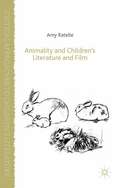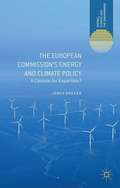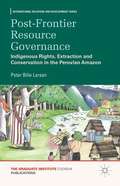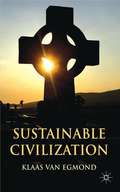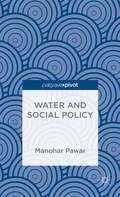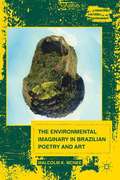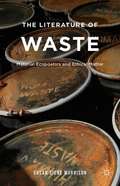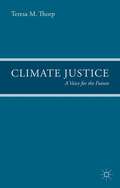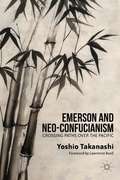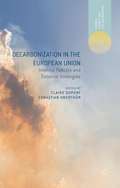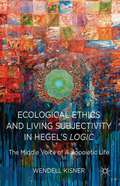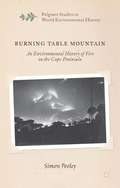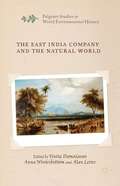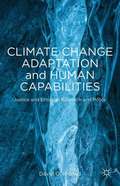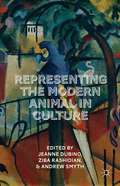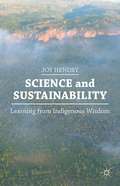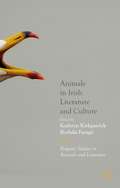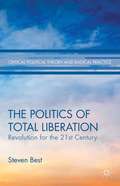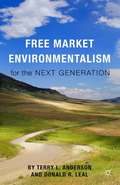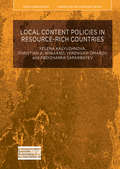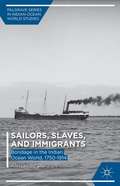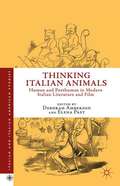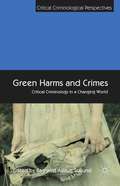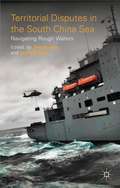- Table View
- List View
Animality and Children’s Literature and Film
by Amy RatelleExamining culturally significant works of children's culture through a posthumanist, or animality studies lens, Animality and Children's Literature and Film argues that Western philosophy's objective to establish a notion of an exclusively human subjectivity is continually countered in the very texts that ostensibly work to this end.
The European Commission�s Energy and Climate Policy
by Jonas DregerThis book offers a deep insight into the genesis and development of the European Commission's energy and climate legislation, focusing on the interplay of politics and science. How does the Commission react when confronted with knowledge? According to the author, the Commission functions as catalyst transforming knowledge into politics.
Post-frontier Resource Governance
by Peter Bille LarsenThe 20th century involved an unprecedented scramble for resources reaching the most remote corners of the world. Simultaneously, a quiet revolution has taken place with environmental protection, land and community rights regimes gradually taking hold, albeit unevenly, across the global South. Institutional topographies and policies have never before appeared as green and socially inclusive, yet co-exist with a deepening socio-environmental crisis. Intensified pressures stand in contrast to,persist, and even thrive under new environmental and social protection measures. The author offers an anthropological analysis of the paradox. Building on the concept of post-frontier governance, he presents a portrayal of the host of new regulatory technologies, practices and institutions that nominally close, yet more accurately characterize and restructure, contemporary resource frontiers. The book examines these arrangements ethnographically in the Peruvian Amazon by focusing on the Y#65533;nesha people and their involvement with the organization of indigenous rights, conservation and protected area planning, logging, and oil development.
Sustainable Civilization
by Klaas Van EgmondWestern civilization has entered a new fundamental crisis that can be explained by a very one-sided orientation of social values based on materialism and egocentrism, which is disrupting the delicate balance between the opposing forces of 'mind' and 'matter', and of 'I' and 'the others'. Many sources from the great works of philosophy, religion, art and culture to social surveys and the course of history qualify sustainability as the dynamic equilibrium between fundamental opposing forces. This insight and the ethical ability to better discriminate between stabilizing and destabilizing forces would allow further justification of human rights and new institutional arrangements in society at large and, in particular, in politics, economy and finance. It would enable a sustainable civilization to flourish within the boundaries of freedom and human dignity. "
Water and Social Policy
by Manohar PawarManohar Pawar discusses the relevance and importance of social policy for water issues. By analysing several interrelated perspectives on water, he suggests core values as bases for formulating and implementing social policies so as to provide universal free access to safe drinking water for all, particularly for the most poor and disadvantaged.
The Environmental Imaginary In Brazilian Poetry And Art
by Malcolm K. McneeThis study contributes to ongoing discussions on the connections between the environmental imaginary and issues of identity, place and nation. Utilizing a delimited ecocritical approach, McNee puts Brazilian culture, through the work of contemporary poets and visual artists, into a broader, transnational dialogue.
The Literature of Waste
by Susan Signe MorrisonTracing material and metaphoric waste through the Western canon, ranging from Beowulf to Samuel Beckett, Susan Morrison disrupts traditional perceptions of waste to better understand how we theorize, manage, and are implicated in what is discarded and seen as garbage. Engaging a wide range of disciplines, Morrison addresses how the materiality of waste has been sedimented into a variety of toxic metaphors. The vibrancy of matter itself disturbs these metaphors, especially those used to characterize people as disposable garbage. If scholars can read waste as possessing dynamic agency, how might that change the ethics of refuse-ing and ostracizing wasted humans? A major contribution to the growing field of Waste Studies, this comparative and theoretically innovative book confronts the reader with the ethical urgency present in waste literature itself.
Climate Justice
by Teresa M. ThorpIn this ground-breaking work, Teresa Thorp tackles the causes and effects of climate injustice by methodically mapping out an approach by which to reach a negotiated consensus with legal force to protect present and future generations. Using the law and policy of climate change as a vehicle for illustrating how to shape our future, she comprehensively overturns the widely held contemporary view of climate justice as inconstant charitable acts, relative systemic notions and static concepts isolated from the common good and a congruent rule of law. Responding to the adverse impacts of climate change (heat waves, extended drought, severe flooding and desertification), which represent an urgent and potentially irreversible threat to human societies and the planet, requires a new and cohesive way of thinking about global policy and the law. The mission of guaranteeing and realising human dignity, human security and human rights is multi-fold. Looking through the lens of kaleidoscopic normativity, an extensible language anchored in common juridical elements should facilitate how norms enter the socio-legal frame and interact within it. Users need to be able to display and interpret the congruent legal norm in order to obey and apply it. Galvanising this process by constitutionalising first principles and consequential norms is vital for attaining fraternity between nations and among all people. Climate Justice - A Voice for the Future is an essential read for scholars, practitioners and all those genuinely interested in reaching consensus on a post-2015 global climate accord, a unified development agenda and a cohesive pact for disaster-risk reduction.
Emerson and Neo-Confucianism
by Yoshio TakanashiA comparative investigation of Emerson's Transcendental thought and Zhu Xi's Neo-Confucianism, this book shows how both thinkers traced the human morality to the same source in the ultimately moral nature of the universe and developed theories of the interrelation of universal law and the human mind.
Decarbonization in the European Union
by Claire Dupont Sebastian Oberth�rIn October 2009, the European Union (EU) agreed to reduce greenhouse gas (GHG) emissions by between 80 and 95 per cent by 2050 in the EU as a whole, as compared to 1990 levels – an objective that is in line with scientific calls to ensure we have a chance of limiting global temperature increase to 2#65533;Celsius. With the EU's energy sector required to almost completely decarbonise by 2050 (meaning almost zero GHG emissions from energy production, transportation and consumption), a major transition in just a few decades is necessary to achieve this goal. Therefore, a long-term policy perspective towards 2050 is essential. Many decisions taken today influence the EU's ability to meet its decarbonisation goals. The authors investigate how far the EU is along the road to decarbonisation, and what remains to be done in policy development. They also seek to understand whether the decarbonisaton goal is a central feature of the EU's external relations with its energy partners, andhow these relations could change under decarbonisation.
Ecological Ethics and Living Subjectivity in Hegel’s Logic
by Wendell KisnerBy interweaving Hegelian dialectic and the middle voice, this book develops a holistic account of life, nature, and the ethical orientation of human beings with respect to them without falling into the trap of either subjecting human rights to totality or relegating non-human beings and their habitats to instrumentalism.
Burning Table Mountain
by Simon PooleyThis is an environmental history of humans and wildfire on the Cape Peninsula, from the practices of Khoikhoi herders to the conflagrations of January 2000. The book examines how the region's unique, famously diverse fynbos vegetation has been transformed since European colonial settlement, through urbanisation and biological modifications.
The East India Company and the Natural World
by Vinita DamodaranThis book is the first to explore the deep and lasting impacts of the largest colonial trading company, the British East India Company on the natural environment. The contributors - drawn from a wide range of academic disciplines - illuminate the relationship between colonial capital and the changing environment between 1600 and 1857.
Climate Change Adaptation and Human Capabilities
by David O. KronlidClimate Change Adaptation and Human Capabilities explores learning, health, mobility, and play as climate capabilities and produces new insights into the depth of climate change impact on social life.
Representing the Modern Animal in Culture
by Jeanne DubinoExamining a wide range of works, from Gulliver's Travels to The Hunger Games, Representing the Modern Animal in Culture employs key theoretical apparatuses of Animal Studies to literary texts. Contributors address the multifarious modes of animal representation and the range of human-animal interactions that have emerged in the past 300 years.
Science and Sustainability
by Joy HendryIndigenous science is often dismissed as quackery or nonsense, out of touch with progress and current events. However, Indigenous peoples have passed down vital information for generations, from which local plants help cure common ailments, to which parts of the land are unsuitable for buildings because of likely earthquakes. These scientific practices that have been developed by Indigenous peoples around the world have been largely ignored by Western colonizers in their lands. From Japan and New Zealand to Australia and Canada, Indigenous science involves environmentally-focused, sustainable practices that allow people to live with the land rather than in spite of it. Here, Hendry examines science through these Indigenous roots, problematizing the idea that Western science is the only type that deserves that name and drawing attention to some of its shortcomings. She takes the reader with her on the learning process and shares a myriad of sustainable examples that can be put into practice.
Animals in Irish Literature and Culture
by Kathryn Kirkpatrick Borbála FaragóAnimals in Irish Literature and Culture spans the early modern period to the present, and includes essays exploring some of Ireland's better known animals—birds, horses, pigs, cows, and dogs—as well as its less considered animals—hares, foxes, eels, and insects. The collection also unsettles the boundaries and definitions of 'nation' by exploring colonial, post-colonial, and globalized manifestations of Ireland as country and state as well as the human animal and non-humananimal migrations that challenge a variety of literal and cultural borders. In essays addressing a range of Irish cultural production, contributors consider the impacts of conceptual categories of nature, animality, and humanness on actual human and animal lives. Emerging in the era of the sixth mass extinction, brought on by human-induced climate change and habitat destruction, this volume aims to make a contribution to eco-critical thought and practice in Irish Studies and beyond.
The Politics of Total Liberation
by Steven BestThis book argues that there is an ongoing planetary crisis, in both the social and natural worlds, that is of urgent importance. This demands a new politics, a politics of total liberation, one that grasps the need to unite the disparate movements for human, animal, and earth liberation. In the book, Best outlines a way forward despite challenges.
Free Market Environmentalism for the Next Generation
by Terry L. Anderson Donald R. LealThis book provides a vision for environmentalism's future, based on the success of environmental entrepreneurs around the world. The work provides the next generation of environmental market ideas and the chapters are co-authored with young scholars and policy analysts who represent the next generation of environmental leaders.
Hogarth’s Art of Animal Cruelty: Satire, Suffering and Pictorial Propaganda
by Piers BeirneWilliam Hogarth, one of England's foremost artists, made extensive use of animal images - as hybrids, edibles, companions, emblems of satire and objects of cruelty. Hogarth's Art of Animal Cruelty: Satire, Suffering and Pictorial Propaganda offers an important examination of Hogarth's intentions in the Four Stages of Cruelty (1751), a series of four prints generally neglected by art historians and wrongly identified by legal historians and other scholars as a milestone in the development of animal rights. In this book, Beirne analyses how Hogarth's various audiences would have reacted to his gruesome images, and ultimately what was meant by 'cruelty'.
Local Content Policies in Resource-rich Countries
by Christian A. Nygaard Yelena Kalyuzhnova Yerengaip Omarov Abdizhapar SaparbayevThis book analyses the role of local content (LC) policy in the economic development of five resource-rich countries: Brazil, Kazakhstan, Norway, Russia and the UK. The authors situate LC policy within a framework of sustainability in the form of industrial diversification and innovation-led growth, and examine how effective LC policies are in facilitating sectoral and economy-wide catching up. Structured in five chapters, the book begins with an introduction and then presents an overview of LC definitions and situates LC policies within a framework of economic development. The third chapter compares specific examples of LC development and highlights variations in practice as well as learning across case countries. The fourth chapter focuses on macro-economic, micro-economic and institutional challenges conditioning LC development and the ability of LC policies to assist innovation-led growth. The authors conclude by examining what the future holds for LC policies and their role in promoting economic growth and addressing the wider social, political and economic challenges in resource-rich countries.
Sailors, Slaves, and Immigrants
by Alessandro StanzianiSlaves, convicts, indentured immigrants, and unfree seamen have traveled the world's oceans at many times and places throughout human history. Across the Atlantic, Mediterranean, Indian, and Pacific Oceans, this bondage took divergent forms and exhibited a range of historical dynamics. In spite of this variety, the conventional Atlantic World historical paradigm has largely shaped our understanding of modernity as being defined by exploration and discovery, European dominance, global capitalism, and the transition from slavery to free labor. Not only does this perspective evince a Eurocentric emphasis on the 'uniqueness' of the West, but it is increasingly contested even for the Atlantic itself. This provocative study contrasts the romantic conflation of freedom and the sea with the complex labor relationships of seamen, slaves, and immigrants in the Indian Ocean during the long nineteenth century. In the process, it advances a new framework for understanding labor, bondage, and modernization.
Thinking Italian Animals
by Deborah Amberson Elena PastSituated on the cutting edge of scholarship in a variety of fields, this bracing volume draws together essays on Italian writers and filmmakers whose work engages with nonhuman animal subjectivity. Analyzing works from unification to the present, they address three major strands of current philosophical thought: the perceived borders between man and nonhuman animals, historical and fictional crises facing humanity, and human entanglement with the nonhuman and material world. These essays are driven by philosophical, theoretical, and ethical questions that interrogate Italian cultural production in provocative new ways, and their analysis has implications not simply for Italianists, but for a range of scholars doing work within cross-disciplinary fields such as animal studies, ecocriticism, and posthuman philosophy.
Green Harms and Crimes
by Ragnhild Aslaug SollundThe book presents discussions of the application of Stan Cohen's theories alongside empirical contributions in the fields of critical and green criminology. Taken together, the authors critically address harms and crimes against the environment, as well as against human and nonhuman victims.
Territorial Disputes In The South China Sea
by Jing Huang Andrew BilloHeightened tensions in the South China Sea have raised serious concerns about the dangers of conflict in this region as a result of unresolved, complex territorial disputes. This volume offers detailed insights into a range of country-perspectives, addressing the historical, legal, structural, regional and multilateral dimensions of these disputes
